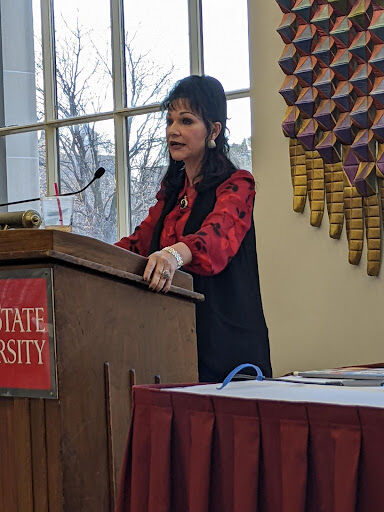Storytelling in the courtroom: A First Amendment right

Judge Aquilina wrapped up the second day of First Amendment Days with her “Dare to Speak, Dare to Listen in the Courtroom: Seeking Justice for All” lecture in the Iowa State Campanile room.
April 11, 2022
Honorable Judge Rosemarie Aquilina was the guest speaker for the second day of First Amendment Days on April 11.
Aquilina spoke in three different Greenlee School classes, attended lunch with faculty and students and finished the day with her lecture, “Dare to Speak, Dare to Listen in the Courtroom: Seeking Justice for All.”
Aquilina is a 30th circuit court judge in Ingham County, Lansing, Michigan. Aquilina has presided over cases such as Larry Nassar, Doctor Mercer, Detroit bankruptcy and Ricky Helen.
Audience members asked questions about her courtroom experience and how she views the legal system, all of which led to a discussion about Judge Aquilina’s interpretation of the legal system.
“The justice system is broken, and I know that,” Aquilina said.
While some judges rule based on strict interpretation of the law, Aquilina said she makes room for all voices in her courtroom.
“I listen because I believe that the backstory is the most important part of the case,” Aquilina said. “And I believe that it’s the people’s courtroom, not mine. I simply borrow it for a short time.”
This is an uncommon approach from the bench.
“It’s really a disservice those people who are just getting a paycheck as a judge, and say, you know, for every drunk driving, you get 30 days and then two years probation,” Aquilina said. “If it’s your first offense or second offense, whatever. There are certain judges that do that. I don’t think that’s appropriate.”
When Aquilina was assigned two back-to-back shoplifting cases, she came to different sentencing for each because she focused on the backstory.
The first case was a college-age girl who stole two swimsuits for her spring break trip. Aquilina gave the girl community service.
The second case was a mother of the same age who struggled financially. The mom was tired of getting hand-me-downs and used clothes. She stole a dress for her daughter to wear on Easter Sunday. Aquilina decided to give the mom resources to help her find financial stability.
“It’s the backstory, and everyone has a different one,” Aquilina said. “And if you’re not listening, then you’re not doing your job.”
While serving, Aquilina made the decision to allow 160 survivors to share their stories in the Larry Nassar case.
Aquilina said that everyday victims tell her, “You told me I matter. No one else does that.”
Aquilina said refuses to succumb to the one-size-fits-all method of strict constructionist judges.
“You have to keep your power,” Aquilina said. “I’m not going to stop just because there are critics. If I made everybody happy, I would not be doing my job.”
Aside from being a judge, Aquilina is also an adjunct professor at Thomas M. Cooley Law School, where she encourages students to discover their values and how best to implement them in the name of justice.
“And I teach my students this, you know, I’m trying to teach you best practices and here’s how I would do it,” Aquilina said. “But I need each of you to develop your own style. Get into court, look at the variations of judges and how they operate and look at the attorneys. And then you’re going to see good and bad attorneys.”
Aquilina encourages everyone to discover themselves, said said it’s the best way to advance society.
“You have to decide who you are,” Aquilina said. “You can only do that with the breadth of experience and understanding of how everyone else in the world operates and your choices. Then you need to understand that First Amendment so that you get choice.”
While Aquilina acknowledges the brokenness of the legal system, she also recognizes that education and involvement is the best solution.
“People should feel a part of all three branches of government, including the judiciary, and especially the judiciary,” Aquilina said.
Experiencing the judiciary branch is inevitable, Aquilina said. Whether it’s a parking ticket, a case of domestic violence, birth or death, people will rely on the judicial system.
In an effort to increase public awareness, Judge Aquilina maintains an open-door policy with the media in her courtroom.
“It’s a little bit almost secretive in a way, even though we’re a public courtroom, because there’s hardly stories compared to the amount of the 1000s of cases I see,” Aquilina said. “There’s very few stories. And so what people are hearing about are those most sensational cases.”
Sensational stories scare people rather than educate them, Aquilina said.
However, with more media coverage in courtrooms through print, broadcast, social media and even Zoom, the legal system becomes more transparent.
“And I believe that it’s the people’s courtroom, not mine,” Aquilina said. “I simply borrow it for a short time. And that everybody affected by a case has the right the absolute constitution protected right to speak in their courtroom.”















